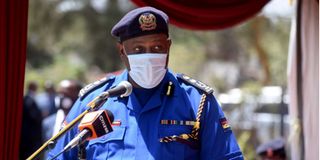Premium
Alcohol levels for drunk driving to be determined in hospitals

Inspector General of National Police Service Hilary Mutyambai speaks during the launch of the Digital Occurrence Book at Buru Buru Police Station in Nairobi on August 3, 2020.
What you need to know:
- According to Mutyambai, the new measures have been enforced following a spike in fatalities on the roads linked to drunk-driving.
- The latest development comes just days after the National Transport Safety Authority (NTSA) and the IG announced the resumption of alcoblow operations
The Inspector-General of Police Hillary Mutyambai has announced new measures in the enforcement of random alcohol checks on all major towns.
The IG, in his weekly #EngageTheIG Q&A session on Twitter, said alcohol levels will be determined in hospitals under strict Covid-19 rules.
“The alcohol levels in the bloodstream will be determined by doctors in hospitals under strict Covid-19 rules,” Mutyambai said.
The police boss however fell short of stating who will foot the hospital bills in this new arrangement.
According to Mutyambai, the new measures have been enforced following a spike in fatalities on the roads linked to drunk-driving.
“There will be random drunk-driving checks mainly because there has been a rise in the number of fatal accidents related to drunk-driving,” the IG said.
The latest development comes just days after the National Transport Safety Authority (NTSA) and the IG announced the resumption of alcoblow operations after a report revealed that 60 people were killed due to drunk driving between October 2 and 4.
Alcoblow tests
Last week the government said it was re-introducing alcoblow tests in major towns in a bid to control road carnage.
In a joint statement, they expressed concern over a spike in road accidents, coming soon after President Uhuru Kenyatta relaxed curfew rules.
General statistics documented by the police and NTSA show that road fatalities between January and September this year stood at 2689, compared to 2,655 during the same period last year, an increase of 1.3 per cent.
At the same time, the death of motorcyclist and pillion passenger in road accidents increased by 44.94 per cent and 19.44 per cent respectively.
Consequently, the National Police Service was directed to undertake nationwide enforcement operations.





